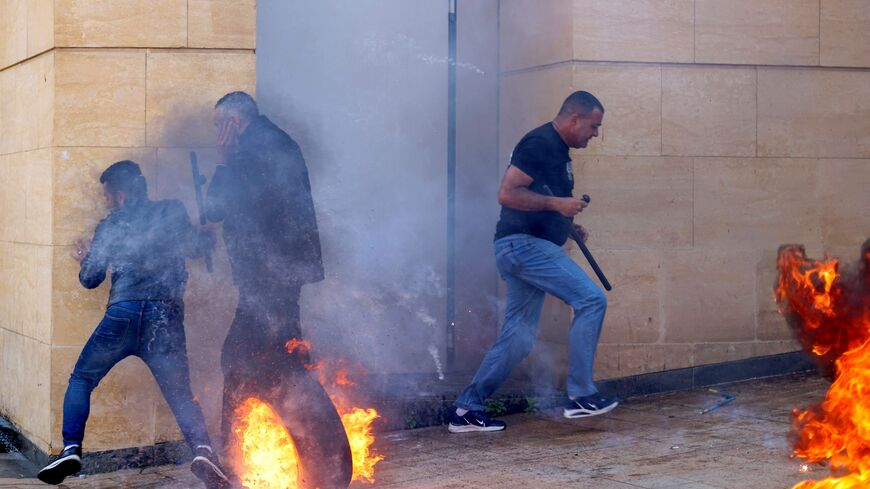The International Monetary Fund (IMF) released a damning assessment of Lebanon’s economy on Thursday as the country slides further into economic and political crisis.
The Washington-based financial institution said the “continuation of the status quo” in crisis-stricken Lebanon will have significant consequences. The IMF specifically mentioned dollarization, whereby business demand to be paid in dollars instead of the local currency, as well as inflation and decreased government revenue.
“Further delays of reforms will keep confidence low and cash dollarization of the economy will increase. The exchange rate will continue to depreciate, keeping inflation high,” said the IMF in a press release. “Economic activity will move into informal sectors, further complicating the collection of fiscal revenues.”
The IMF added that without reform, Banque du Liban, Lebanon’s central bank, “saddled with unaddressed losses and a lack of credibility, will continue to lose international reserves.”
The fund also warned of continued emigration from Lebanon, increased public debt, worsening provision of services by the state, and a myriad of other problems.
To alleviate crisis, the IMF stressed the need for governance and anti-corruption reforms, including: debt restructuring, increased protection to depositors, strengthening Lebanon’s bank secrecy law, and “tight monetary policy” — a reference to raising interest rates.
Why it matters: Lebanon has been suffering from a debilitating economic crisis since 2019. Since then, the Lebanese pound, aka lira, has lost more than 98% of its value and inflation has skyrocketed. There are also food and fuel shortages, and much of the country is without electricity for several hours a day. Many Lebanese are also unable to access their savings due to bank mismanagement, leading to several armed holdups of banks in the past year.
The IMF, the United States and France have said that Lebanon must enact anti-corruption and governance reforms to unlock more aid, but the Lebanese government has failed to do so. The IMF and Lebanon reached a conditional agreement on a $3 billion loan last year, but the loan has yet to materialize due to the lack of reform.
Moreover, Lebanon has been without a head of state since former President Michel Aoun’s term ended last October. Parliament has failed to elect a president more than 10 times since then. This is due to disagreements between the Shiite Islamist organization Hezbollah and rival parties.
The IMF assessment comes as Lebanon’s crisis is growing worse. Reuters reported earlier this month that the presidential paralysis is worsening sectarian tensions in the country. The presidency is historically held by a Lebanese Christian. Hezbollah supports Suleiman Frangieh, a pro-Iran candidate. The other nominee supported by Christian parties is Jihad Azour, himself an IMF official who has taken leave now. Lebanon’s pro-Hezhollah Shiite mufti Sheikh Ahmad Qabalan recently slammed Azour, saying he is backed by Israel and the US, according to Reuters.
Banque du Liban head Riad Salameh is allegedly at the center of Lebanon’s endemic corruption, and is facing increased international pressure. Salameh has been accused of embezzling hundreds of millions of dollars out Lebanon, and is under investigation by several European governments as a result. Last month, Germany issued a second arrest warrant for Salameh. He is also under investigation in France, Switzerland and other countries.
In March, the lira hit a new low of 100,000 to the US dollar on the black market. It has since recovered slightly to around 92,000 to the US dollar, according to the LiraRate website. Before the crisis, the currency traded at 1,500 to the dollar for decades.
Hostility towards refugees is increasing amid the crisis. In May, Amnesty International criticized an uptick in deportations of Syrians from Lebanon.
“The deportations come amid an alarming surge in anti-refugee rhetoric in Lebanon and other coercive measures intended to pressure refugees to return,” said the London-based rights watchdog in a statement.
In March, the IMF sent a delegation to Lebanon. The delegation said the country was “at a very dangerous moment” due to the slow progress of reform at the time, according to Agence France-Presse.
Know more: The IMF is not alone in its assessment. In December, Human Rights Watch warned of rising poverty and hunger in Lebanon.








